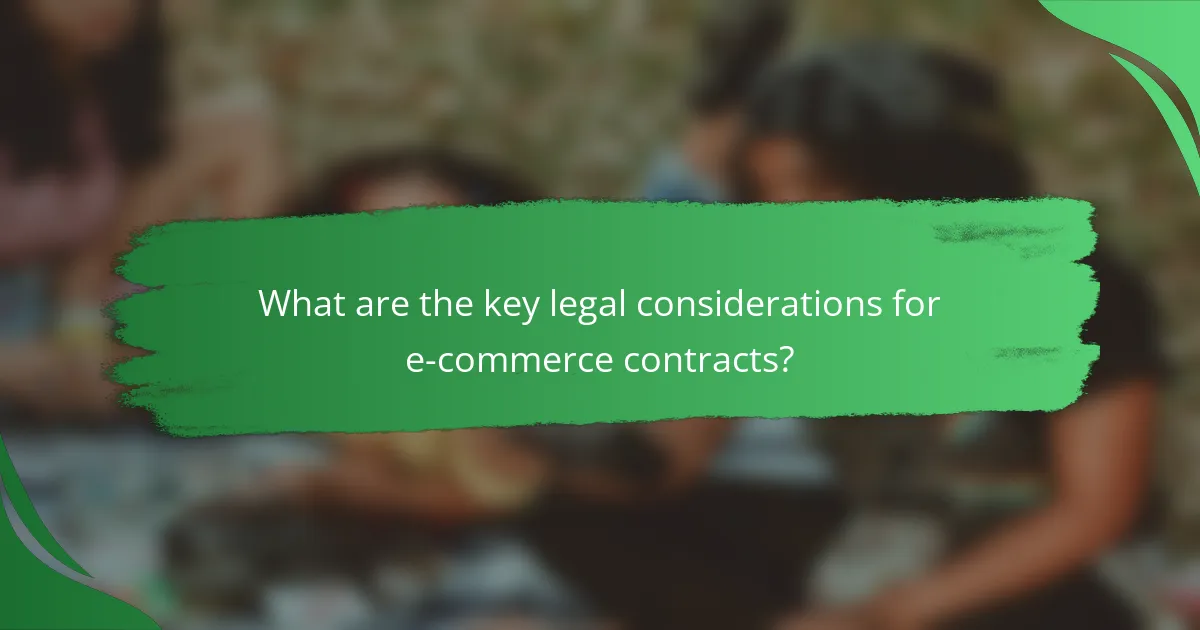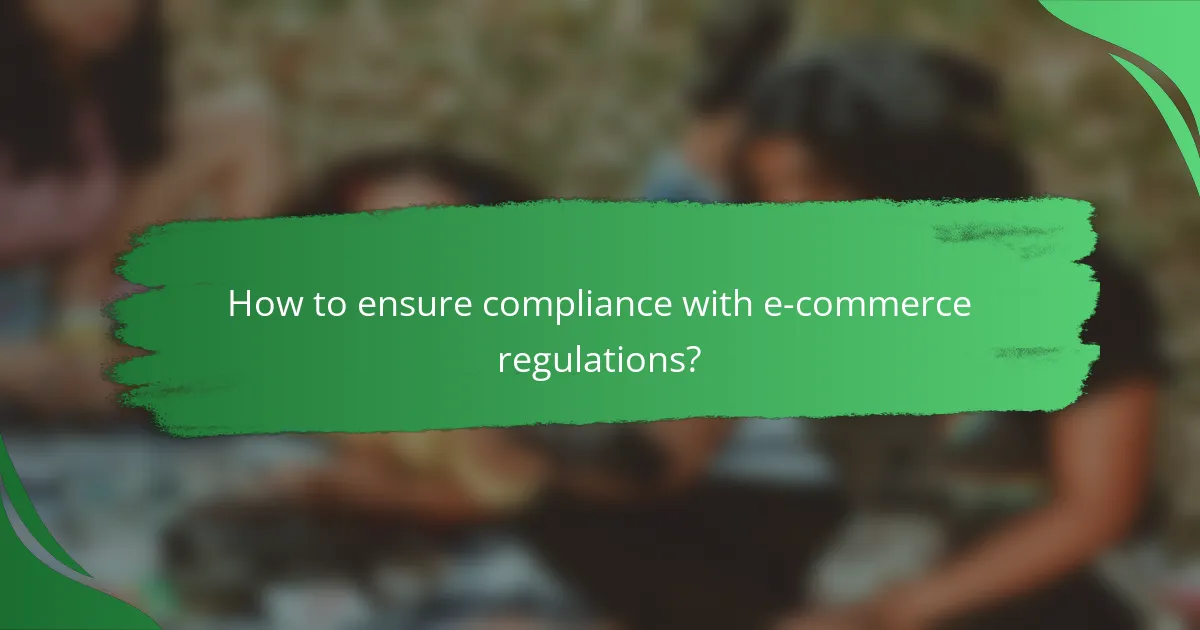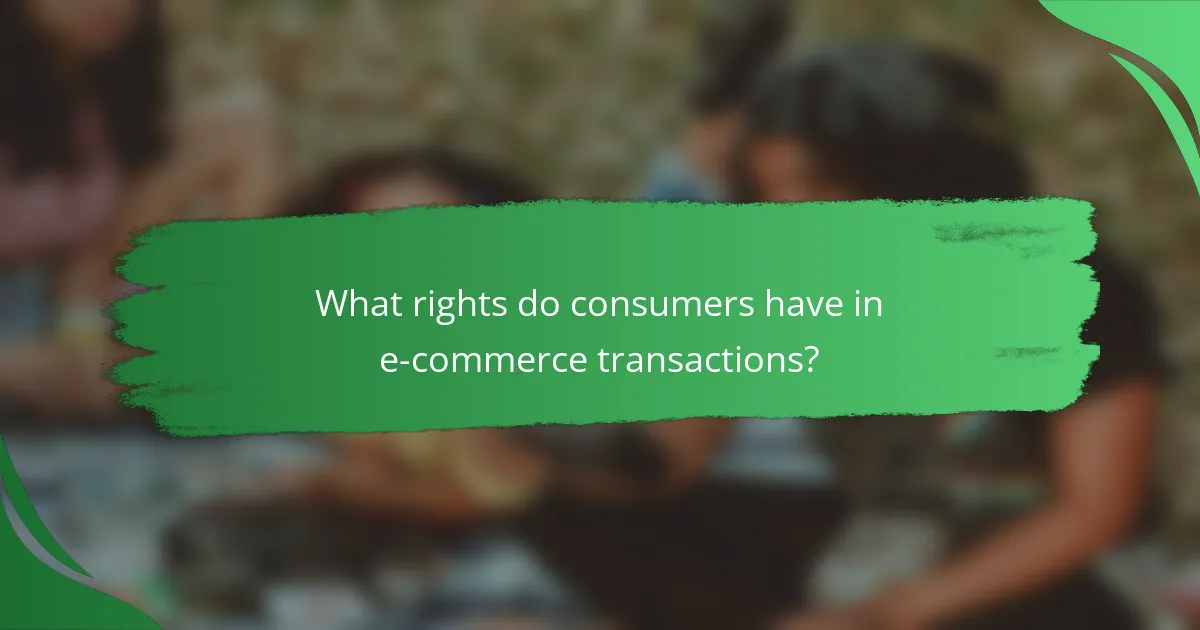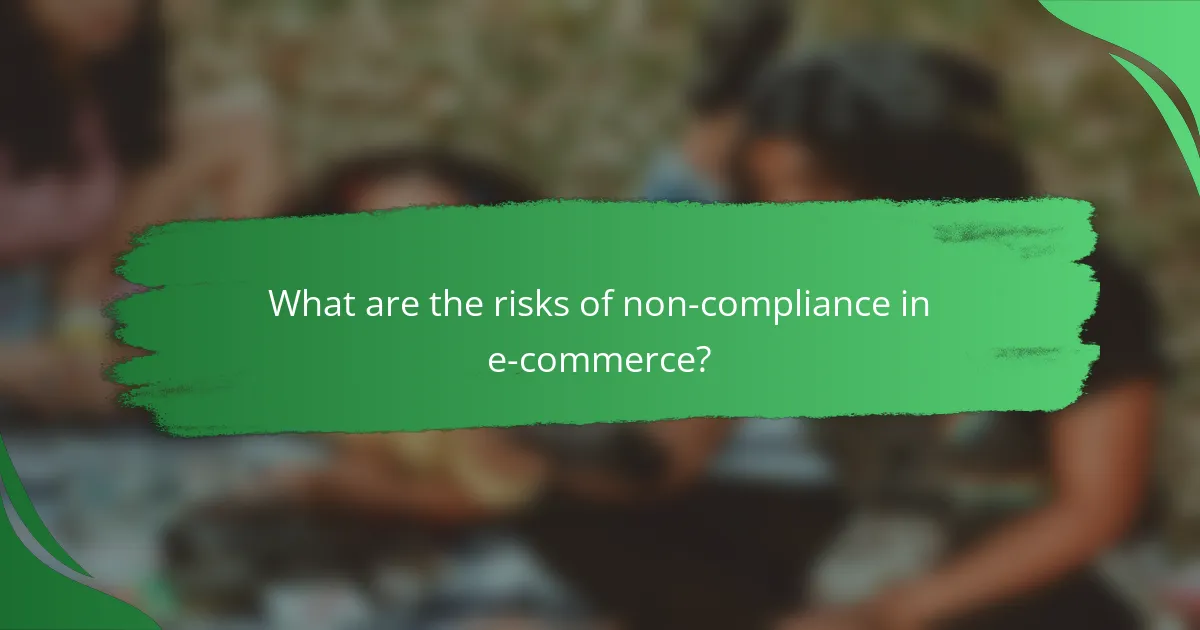Understanding legal considerations in e-commerce is crucial for businesses to navigate contracts, rights, and compliance effectively. Key aspects include the formation and enforceability of contracts, adherence to consumer protection laws, and compliance with data protection and payment processing regulations. By addressing these elements, businesses can create valid agreements and ensure a fair shopping experience for consumers.

What are the key legal considerations for e-commerce contracts?
Key legal considerations for e-commerce contracts include understanding contract formation requirements, essential clauses, enforceability, jurisdictional issues, and consumer protection laws. These elements help ensure that online agreements are valid, enforceable, and compliant with applicable regulations.
Contract formation requirements
For an e-commerce contract to be valid, it must meet specific formation requirements, including offer, acceptance, consideration, and mutual intent to create a legal obligation. An offer can be made through a website or app, and acceptance typically occurs when a consumer clicks “accept” or completes a purchase.
Consideration refers to something of value exchanged between parties, such as payment for goods or services. It’s crucial to ensure that both parties understand and agree to the terms to avoid disputes later.
Essential contract clauses
Essential clauses in e-commerce contracts often include terms of service, privacy policies, payment terms, and dispute resolution procedures. These clauses clarify the rights and responsibilities of both the seller and the buyer.
Including a clear refund policy is also vital, as it sets expectations for returns and exchanges. Ensure that these clauses are easily accessible to users to promote transparency and trust.
Enforceability of online agreements
The enforceability of online agreements can depend on how well they comply with legal standards. Courts generally recognize clickwrap agreements, where users must actively agree to terms before proceeding, as enforceable.
However, browsewrap agreements, where terms are implied by simply using the site, may face challenges in court. To enhance enforceability, ensure that users are presented with clear terms and have the opportunity to review them before agreeing.
Jurisdictional issues in e-commerce
Jurisdictional issues arise when e-commerce transactions cross state or national borders. It’s essential to determine which laws apply to the contract, as different jurisdictions may have varying regulations regarding consumer rights and business obligations.
Including a choice of law clause in your contracts can help clarify which jurisdiction’s laws will govern the agreement. This can prevent legal complications and provide a clearer framework for resolving disputes.
Consumer protection laws
Consumer protection laws are designed to safeguard buyers in e-commerce transactions. These laws vary by country but generally include regulations on false advertising, product safety, and the right to cancel purchases within a specified period.
In the U.S., the Federal Trade Commission (FTC) enforces many of these laws, while the European Union has robust consumer protection directives. Familiarize yourself with the relevant laws in your operating regions to ensure compliance and protect your customers’ rights.

How to ensure compliance with e-commerce regulations?
To ensure compliance with e-commerce regulations, businesses must understand and adhere to various legal requirements that govern online transactions. This includes data protection laws, payment processing standards, and tax obligations specific to their operational regions.
Understanding GDPR implications
The General Data Protection Regulation (GDPR) is a critical framework for any e-commerce business operating in or targeting customers in the European Union. It mandates that companies protect personal data and privacy, requiring explicit consent from users before collecting their information.
Businesses must implement clear privacy policies, allow users to access their data, and provide options for data deletion. Non-compliance can result in hefty fines, often reaching up to 4% of annual global revenue or €20 million, whichever is higher.
Data privacy requirements
Data privacy requirements vary by region but generally involve securing customer information and ensuring transparency about data usage. Companies should regularly audit their data handling practices and employ encryption to protect sensitive information.
It’s essential to inform customers about their rights regarding data access and deletion. Providing a straightforward opt-out mechanism for marketing communications can also enhance compliance and customer trust.
Payment processing regulations
Payment processing regulations focus on the security and integrity of financial transactions. In the U.S., the Payment Card Industry Data Security Standard (PCI DSS) outlines requirements for businesses that handle credit card information, including encryption and secure storage practices.
Merchants should choose payment processors that comply with these standards and regularly review their security measures to prevent data breaches. Understanding local regulations regarding chargebacks and fraud protection is also crucial for maintaining compliance.
Tax compliance for online sales
Tax compliance for online sales involves understanding and applying the correct sales tax rates based on the customer’s location. In the U.S., this can vary significantly by state, with some states requiring sales tax on digital goods and services.
Businesses should implement systems to automatically calculate and collect the appropriate sales tax during transactions. Regularly reviewing tax obligations and staying updated on changes in tax laws can help avoid penalties and ensure compliance.

What rights do consumers have in e-commerce transactions?
Consumers in e-commerce transactions have several important rights designed to protect them from unfair practices and ensure a satisfactory shopping experience. These rights typically include the ability to return products, warranty protections, and safeguards against misleading advertising.
Right to return and refund policies
Consumers generally have the right to return items purchased online within a specified period, often ranging from 14 to 30 days, depending on the retailer’s policy. Refunds are typically issued in the original payment method, although some retailers may offer store credit instead.
It’s crucial for consumers to review the return policy before making a purchase. Look for details on return shipping costs, restocking fees, and any conditions that might affect eligibility for a refund. Always keep receipts and documentation to facilitate the return process.
Consumer warranty rights
In many regions, consumers are entitled to warranty protections that ensure products are free from defects and meet certain quality standards. These warranties can be statutory, meaning they are mandated by law, or voluntary, provided by the seller or manufacturer.
For example, in the European Union, consumers benefit from a two-year warranty period for new goods, during which they can request repairs, replacements, or refunds for faulty items. Always check the warranty terms and conditions to understand your rights and the process for claiming them.
Protection against false advertising
Consumers are protected against false advertising, which includes misleading claims about a product’s features, benefits, or pricing. Regulations require that advertisements be truthful and not omit essential information that could influence purchasing decisions.
If a consumer believes they have been misled by advertising, they can often file a complaint with consumer protection agencies. Keeping records of advertisements and communications with the seller can help support claims of false advertising.

What are the risks of non-compliance in e-commerce?
Non-compliance in e-commerce can lead to serious consequences, including legal penalties, reputational damage, and significant financial losses. Understanding these risks is crucial for any online business to operate successfully and sustainably.
Legal penalties for non-compliance
Legal penalties for non-compliance can vary widely depending on the jurisdiction and the specific regulations violated. Businesses may face fines, sanctions, or even legal action, which can disrupt operations and lead to costly litigation.
For example, failing to adhere to data protection laws like the GDPR in Europe can result in fines amounting to millions of euros, while violations of consumer protection laws can lead to additional penalties. It is essential for e-commerce businesses to stay informed about applicable laws to avoid these risks.
Reputational damage
Reputational damage from non-compliance can have long-lasting effects on an e-commerce business. Negative publicity can arise from legal issues or customer complaints, leading to a loss of trust and credibility in the market.
For instance, if a company is found to mishandle customer data, it may face backlash on social media and review platforms, which can deter potential customers. Maintaining compliance helps protect a brand’s reputation and fosters customer loyalty.
Financial implications
The financial implications of non-compliance can be severe, impacting both immediate cash flow and long-term profitability. Costs may arise from fines, legal fees, and the need to implement corrective measures to meet compliance standards.
Additionally, businesses may experience decreased sales due to loss of customer trust or increased operational costs from having to overhaul compliance processes. Investing in compliance upfront can mitigate these risks and save money in the long run.

How to draft effective e-commerce contracts?
To draft effective e-commerce contracts, focus on clarity, specificity, and legal compliance. Ensure that all terms are well-defined and that the contract addresses the needs of both parties while adhering to relevant regulations.
Best practices for contract language
Use clear and concise language to avoid ambiguity in your e-commerce contracts. Define key terms at the beginning and use consistent terminology throughout the document. Avoid legal jargon unless necessary, and consider including a glossary for complex terms.
Structure your contract logically, starting with an introduction, followed by definitions, obligations, and terms of termination. This organization helps both parties easily navigate the document and understand their rights and responsibilities.
Negotiation strategies
Effective negotiation strategies for e-commerce contracts include understanding the interests of both parties and being prepared to compromise. Start by identifying your non-negotiables and areas where you can be flexible, which will help facilitate a productive discussion.
Use clear communication during negotiations to ensure that all parties understand the terms being discussed. Consider employing techniques such as active listening and summarizing points to confirm mutual understanding. It may also be beneficial to establish a timeline for negotiations to keep the process on track.


